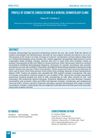 April 2024 in “International journal of women's health”
April 2024 in “International journal of women's health” Adult female acne is a complex condition that can worsen with menopause, requiring holistic treatment and tailored skincare at different life stages.
 March 2024 in “Journal of Experimental & Biomedical Sciences/Biomedical Science Letters”
March 2024 in “Journal of Experimental & Biomedical Sciences/Biomedical Science Letters” BCC can protect heart cells from damage caused by oxidative stress.
 August 2023 in “JOJ dermatology & cosmetics”
August 2023 in “JOJ dermatology & cosmetics” Antibiotics often cause skin reactions, making them a major health concern.
 November 2019 in “Nepal Medical College journal”
November 2019 in “Nepal Medical College journal” Most people getting cosmetic dermatology are young, educated, working women with a good income, mainly concerned about wrinkles and often choosing chemical peeling.


Botulinum toxin type A significantly reduces scalp psoriasis severity compared to placebo.
 January 2017 in “Acta dermato-venereologica”
January 2017 in “Acta dermato-venereologica” The congress showed that psychological therapy can help skin condition patients, social media affects acne stigma, education improves atopic dermatitis, and patient satisfaction in dermatology is high, especially with good doctor engagement.
 May 2016 in “Cambridge University Press eBooks”
May 2016 in “Cambridge University Press eBooks” Eating disorders are serious, often undiagnosed conditions requiring early treatment, with anorexia being the most deadly and binge-eating the most treatable.
 January 2016 in “International journal of reproduction, contraception, obstetrics and gynecology”
January 2016 in “International journal of reproduction, contraception, obstetrics and gynecology” A certain gene variation is linked to a higher risk of polycystic ovarian syndrome in South Indian women.
 17 citations,
November 2021 in “Journal of Cosmetic Dermatology”
17 citations,
November 2021 in “Journal of Cosmetic Dermatology” Combination therapies for androgenetic alopecia work best but can have significant side effects and costs.
 January 2024 in “Al-Azhar International Medical Journal /Al-Azhar International Medical Journal”
January 2024 in “Al-Azhar International Medical Journal /Al-Azhar International Medical Journal” Betamethasone valerate lotion is more effective for treating multiple patchy alopecia areata.
January 2018 in “Sohag Medical Journal” 60 citations,
December 2021 in “Cytokine & growth factor reviews” PRP therapy shows promise in healing and tissue repair across various medical fields but needs more research for standardization and optimization.
488 citations,
July 2021 in “Cell” Fibroblasts are crucial for tissue repair and inflammation, and understanding them can help treat fibrotic diseases.
January 2022 in “Pastic and aesthetic research” PRP helps skin regeneration but needs standardized testing for consistent results.
13 citations,
April 2021 in “Value in Health” There is a significant need for better-validated quality of life tools in dermatology.
 3 citations,
November 2021 in “Clinical, Cosmetic and Investigational Dermatology”
3 citations,
November 2021 in “Clinical, Cosmetic and Investigational Dermatology” Platelet-Rich Plasma may improve skin health and reduce wrinkles, but more research is needed for standard treatment guidelines.
 2 citations,
May 2021 in “Stem Cells International”
2 citations,
May 2021 in “Stem Cells International” Human pluripotent stem cells could be used to make platelets for medical use, but safety, effectiveness, and cost issues need to be resolved.
1 citations,
December 2023 in “Life” PRP helps skin heal, possibly through special cells called telocytes.
April 2024 in “Journal of clinical medicine” Recognizing specific skin features helps diagnose and manage lupus erythematosus effectively.
March 2024 in “International journal of molecular sciences” Three specific genetic variants cause severe skin issues in children with EBS, highlighting the need for early genetic screening.
 January 2024 in “Authorea (Authorea)”
January 2024 in “Authorea (Authorea)” Nanomaterials can significantly improve wound healing and future treatments may include smart, real-time monitoring.
January 2024 in “Medicina” Proper planning and technique in upper-face feminization surgery are crucial to avoid complications and revisions.
November 2023 in “Bioengineering” AMT® is effective and safe for early-stage knee osteoarthritis.
 47 citations,
November 2012 in “Wound repair and regeneration”
47 citations,
November 2012 in “Wound repair and regeneration” Nude mice with grafted human skin developed scars similar to human hypertrophic scars.
 9 citations,
May 2012 in “Journal of Craniofacial Surgery”
9 citations,
May 2012 in “Journal of Craniofacial Surgery” Submental tissue is good for repairing mouth area skin with minimal scarring and good cosmetic results.
 October 1987 in “Clinics in Dermatology”
October 1987 in “Clinics in Dermatology” Scalp reduction can improve hair distribution in certain baldness cases but requires careful patient selection and understanding of facial structure.
 19 citations,
January 2007 in “Journal of medical investigation”
19 citations,
January 2007 in “Journal of medical investigation” GFP transgenic mice help study cell origins in skin grafts.
 78 citations,
October 2020 in “Experimental Dermatology”
78 citations,
October 2020 in “Experimental Dermatology” Hidradenitis suppurativa is caused by genetic factors, inflammation, bacteria, hormones, and lifestyle factors like obesity and smoking.


















